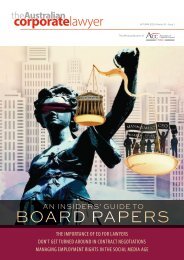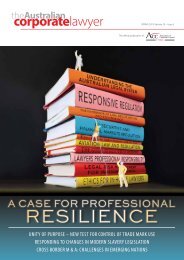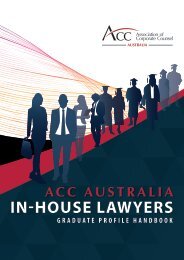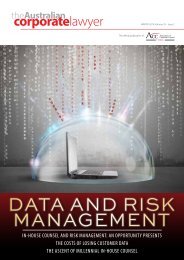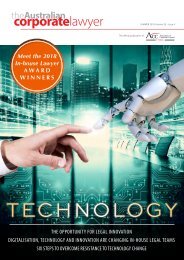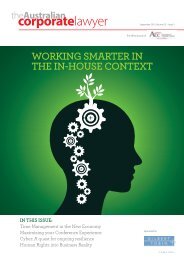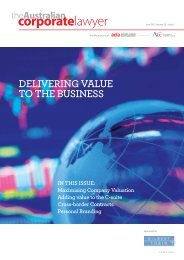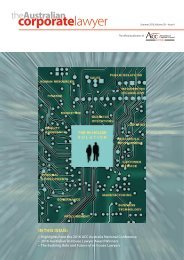Australian Corporate Lawyer - Autumn 2017
Australian Corporate Lawyer is the official publication of the Association of Corporate Counsel (ACC) Australia. The Autumn 2018 issue focuses on 'The Law and Technology' and features a range of articles covering topics including: the future of contracts and; the future of law firms as software companies..
Australian Corporate Lawyer is the official publication of the Association of Corporate Counsel (ACC) Australia. The Autumn 2018 issue focuses on 'The Law and Technology' and features a range of articles covering topics including: the future of contracts and; the future of law firms as software companies..
You also want an ePaper? Increase the reach of your titles
YUMPU automatically turns print PDFs into web optimized ePapers that Google loves.
acla.acc.com<br />
managers, we developed compliance<br />
platform software, databases and a predictive<br />
analytics tool. The availability of new software<br />
development platforms and techniques make<br />
it possible to develop some software quickly<br />
and inexpensively – often without the need<br />
to write code. There is also the option to<br />
outsource software development or to just<br />
distribute existing software.<br />
Despite the challenges, an increasing number<br />
of global firms have started to offer software<br />
to clients. Examples include SeyfarthLink 5<br />
collaboration and matter management<br />
software supported by Seyfarth Consulting<br />
to provide customised solutions for clients.<br />
DLA Piper has partnered with Exari to provide<br />
DocGen software to clients by adapting a<br />
popular software business model and calling it<br />
‘documents as a service” 6 .<br />
<strong>Australian</strong> firms are also starting to get in on<br />
the act. Minter Ellison recently announced its<br />
ME Taskflow 7 matter management software.<br />
Corrs created a client technology solutions<br />
team which developed for clients an app<br />
called Corrs Crisis Covered and a collaboration<br />
platform called Corrs Collaborate. According<br />
to Berys Amor, the Corrs CIO, “we’re moving<br />
from just being a provider of legal services to<br />
…. giving them a tool they can use to improve<br />
their business process and we’ll slot legal<br />
services into that.” 8<br />
It’s important to note that it’s still very early<br />
days for firms providing software to clients.<br />
Not surprisingly, most of the software being<br />
provided is intended to facilitate the core legal<br />
services business. But firms that I speak to no<br />
longer scoff when I ask them whether they’re<br />
planning to become a software business.<br />
Once firms understand the compelling<br />
business reasons, it’s likely that they will<br />
increasingly provide clients with software<br />
in addition to services. Expect this trend to<br />
accelerate given the rewards in the software<br />
business for ‘first movers’.<br />
Legaltech, NewLaw and others<br />
Providing software to clients may be<br />
relatively new for firms but for many NewLaw<br />
providers it is a fundamental part of their<br />
business model and their value proposition<br />
for clients. Axiom – a global NewLaw<br />
pioneer – offers clients a comprehensive<br />
contract management software solution<br />
called Iris. Riverview Law provides clients<br />
with dashboards and knowledge automation<br />
software using Kim AI technology. In Australia,<br />
Plexus, Hive Legal and Lexvoco are examples<br />
of NewLaw businesses offering in-house<br />
lawyers software products in addition to legal<br />
and other services.<br />
The explosion in the number of Legaltech<br />
companies confirms the commercial<br />
attractiveness of supplying legal software.<br />
According to AngelList 9 , there are almost<br />
1500 Legaltech start-ups, roughly doubling<br />
in number every year. Most Legaltech<br />
companies, especially in Australia, target firms.<br />
However, there are an increasing number of<br />
Legaltech companies supplying software to<br />
in-house departments including U.S -based<br />
companies like Mitratech and Onit, and local<br />
players like Xakia and Yarris. Then there are the<br />
‘others’, like Thomson Reuters that provides<br />
in-house departments with a comprehensive<br />
suite of software products in addition to LPO<br />
services from their Pangea3 acquisition.<br />
Relevance to in-house lawyers.<br />
Based on the developments outlined above,<br />
in-house lawyers can expect to be offered an<br />
ever-increasing and diverse range of software<br />
and ‘non-traditional’ services from firms and a<br />
variety of other businesses. So, what does all<br />
this mean for in-house lawyers?<br />
Until now the choice of an external legal<br />
service provider has largely been based on<br />
legal expertise and the personal relationship<br />
with individual lawyers. Increasingly, that<br />
choice might also need to take into account<br />
software and other services offered by a firm<br />
or NewLaw business. This will be even more<br />
relevant if you have no technology budget<br />
and the software is being offered<br />
for free. However, beware the free lunch!<br />
Will you be able to use the software provided<br />
by one service provider if you want to engage<br />
additional service providers? If so, will it still<br />
be free and remain a viable option? What<br />
happens if, after your legal and business<br />
colleagues have become accustomed to<br />
using the software, you want to stop<br />
obtaining legal services from the provider<br />
that supplied the software?<br />
Choosing legal service providers – even if<br />
it becomes more complicated – is within<br />
the comfort zone of in-house lawyers. But<br />
choosing whether to adopt software, what<br />
software to adopt and who to source it from,<br />
is unfamiliar territory for most. There are many<br />
potential traps in software procurement and<br />
deployment and the organisational impact<br />
is typically significant. To compound the<br />
challenge, the best options for legal services<br />
are almost always local but the same may<br />
not necessarily be true for software. In-house<br />
lawyers may benefit from independent<br />
guidance from those with technology<br />
expertise to develop a technology and data<br />
plan that allows you to pro-actively decide the<br />
right software to use from the right source at<br />
the right time.<br />
What can in-house lawyers do?<br />
It is imperative that in-house lawyers start<br />
taking steps now to take advantage of, and not<br />
be overwhelmed by, the ever-increasing range<br />
of technology on offer. Here are just a few of<br />
the things that I recommend to my clients:<br />
• Increase your individual and team<br />
technology competence – you don’t<br />
necessarily need to learn how to code but<br />
it helps to at least try using a variety of<br />
tools available to improve efficiency and<br />
effectiveness. Enhance team competence<br />
by enlisting help from someone in IT or<br />
hiring tech-savvy employees or consultants.<br />
As the recent UNSW Law School Hackathon<br />
reminded me, it is possible to develop some<br />
excellent technology solutions quickly and<br />
inexpensively in-house.<br />
• Enhance your knowledge of technology<br />
– taking the time to learn about software<br />
and the technology industry will not<br />
only help you make smarter software<br />
selection decisions, it will also help you<br />
and your team to start thinking more like<br />
a software business and how you can<br />
‘productise’ your services.<br />
• Develop ‘non-traditional’ skills – with all<br />
the hype and media focus on technology, it<br />
is sometimes easy to forget that technology<br />
is just one means to innovate and add<br />
value. There are a range of other ways to<br />
do that, involving non-traditional skills<br />
which you can develop internally through<br />
training or that you can procure as<br />
consulting services.<br />
Conclusion<br />
Will firms become software companies? Most<br />
will not, of course. The only certainty is that<br />
software will become a more prominant factor<br />
for you and your colleagues. It will become<br />
‘your business’. When software is eating the<br />
world, the key point for in-house lawyers is to<br />
think beyond the law. Consider how you can<br />
use technology and non-traditional skills to<br />
add value for your business colleagues and<br />
then partner with firms, consultants and other<br />
companies who can help you achieve that.<br />
Footnotes<br />
1 Wall Street Journal August 20, 2011<br />
2 BigLaw definition see http://www.beatoncapital.<br />
com/2013/12/recognise-newlaw-firm/<br />
3 LegalTech refers to software and technologies for use in the<br />
legal profession<br />
4 NewLaw definition see http://www.beatoncapital.<br />
com/2013/12/recognise-newlaw-firm/<br />
5 http://www.seyfarth.com/seyfarthlink<br />
6 https://www.dlapiper.com/en/uk/news/2016/12/dla-piperpartners-with-exari/<br />
7 http://www.minterellison.com/news/Media-Release-ME-<br />
Taskflow-named-Innovative-Project-of-the-Year-by-the-<br />
International-Legal-Technology-Association/<br />
8 http://www.cio.com.au/article/599541/corrs-chamberswestgarth-amor-provides-technology-results-humanapproach/<br />
9 https://angel.co/legal<br />
VOLUME 27, ISSUE 1 – AUTUMN <strong>2017</strong><br />
23



